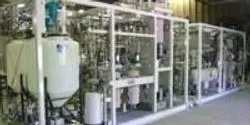Biofuels

Scientists have demonstrated the potential for softwoods to process more easily into pulp and paper if engineered to incorporate a key feature of hardwoods. The finding, published in this week's Proceedings of the National Academy of Sciences, could improve the economics of the pulp, paper and biofuels industries and reduce those industries' environmental impact.

Water-borne algal blooms from farm fertilizer runoff can destroy aquatic life and clog rivers and lakes, but scientists will report today that they are working on a way to clean up these environmental scourges and turn them into useful products. The algae could serve as a feedstock for biofuels, and the feedstock leftovers could be recycled back into farm soil nutrients.

Biofuel producers in Western Canada will soon be able to purify and convert raw glycerol more cost-effectively thanks to an investment of $538,542, announced recently by the Honourable Michelle Rempel, Minister of State for Western Economic Diversification.

A new version of an online tool created by the US Department of Energy’s Argonne National Laboratory will help biofuels developers gain a detailed understanding of water consumption of various types of feedstocks, aiding development of sustainable fuels that will reduce impact on limited water resources.

University of Saskatchewan researchers will share a total of $844,000 from the Canada Foundation for Innovation (CFI) for wide-ranging projects that will explore potential health benefits of using pulse crops in pet and fish feeds, energy-efficient technology for removing water from biofuels, catalysts to clean up air and water, and genetic and environmental factors underlying diseases such as cancer and osteoarthritis.














